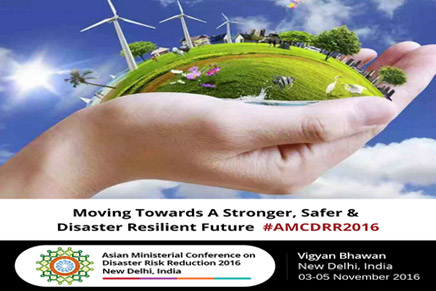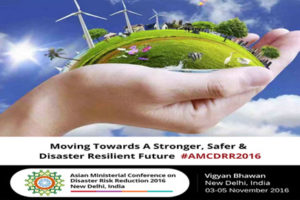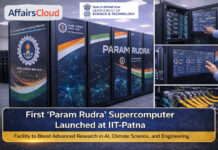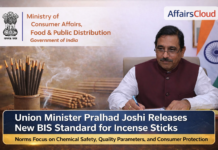Prime Minister Narendra Modi inaugurated the Asian Ministerial Conference on Disaster Risk Reduction in New Delhi held from November 3-5, 2016 and called on the world community to work united on disaster risk reduction.
- Modi outlined a ten-point agenda for renewing efforts towards disaster risk reduction for all development sectors must imbibe principles of disaster risk management and encourage greater involvement and leadership of women in disaster risk management.
PM Modi outlines 10-point agenda for disaster risk reduction
- All development sectors must imbibe the principles of disaster risk management.
- Work towards risk coverage for all starting from poor households to SMEs to multi-national corporations to nation states
- Encourage greater involvement and leadership of women in disaster risk management
- Invest in risk mapping globally. For mapping risks related to hazards like earthquakes we have accepted standards & parameters

- Leverage technology to enhance the efficiency of our disaster risk management efforts
- Develop a network of universities to work on disaster issues
- Utilize the opportunities provided by social media and mobile technologies
- Build on local capacity and initiative
- Opportunity to learn from a disaster must not be wasted. After every disaster there are papers on lessons that are rarely applied
- Bring about greater cohesion in international response to disasters
New Delhi Declaration, Asian Regional Plan adopted at AMCDRR 2016
With the adoption of the ‘New Delhi Declaration’ and the ‘Asian Regional Plan for Implementation of the Sendai Framework’, the three-day Asian Ministerial Conference on Disaster Risk Reduction (AMCDRR) 2016 came to an end.
- The SFDRR (2015-2030) was adopted by at the Third World Conference on DRRat Sendai in Japan in March, 2015.
- It identifies targets and priority action areas towards reducing disaster risk by ‘reducing the damage caused by natural hazards like earthquakes, floods, droughts and cyclones, through an ethic of prevention’.
- The ‘New Delhi Declaration’ is a political statement spelling out the commitment of participating governments towards preventing and reducing disaster risk, and strengthening the resilience of communities, nations and the Asian region. Recognising the need to accelerate the implementation of global frameworks, it commits to a people-centred and whole-of-society approach towards DRR.
- The ‘New Delhi Declaration’ is a political statement spelling out the commitment of participating governments towards preventing and reducing disaster risk, and strengthening the resilience of communities, nations and the Asian region. Recognising the need to accelerate the implementation of global frameworks, it commits to a people-centred and whole-of-society approach towards DRR.
Shri Rajnath Singh felicitates winners at AMCDRR Film Awards ceremony
Union Home Minister, Shri Rajnath Singh gave away the prizes for the winners of the short film competition during the Closing ceremony of the Asian Ministerial Conference for Disaster Risk Reduction (AMCDRR) 2016.
- The competition was held on the theme of Risk Sensitive Development for Community Resilience.
- Ms. Meghna Chawla received the prize for the film ‘The Catalysts of Change Adapting to Changing Weather in Ladakh(India)’ under the category ‘Adapting to Climate Change’. The film, submitted by SEEDS, shows how informed and empowered people will form the adaptive and resilient communities of the future.
A total of 52 entries, telling compelling stories of human resilience in an era of increasing disaster risk and a changing climate, were received from across Asia. The winners were adjudged on a number of parameters such as relevance of the film’s theme, creativity, innovation, originality and quality of production.
India, UNISDR sign Statement of Cooperation on Sendai Framework
India will partner with UNISDR to work towards strengthening the capacity of Asian countries in ensuring risk resilient development. It will also facilitate the sharing of knowledge and experiences, and collaborative efforts towards addressing critical regional challenges.
- Aim: To ensure effective implementation and monitoring of the Sendai Framework through Training and capacity building for Asian countries; promoting international and regional cooperation to reinforce political commitment, facilitate knowledge sharing and strengthen the capacity of UNISDR for monitoring and review of the Sendai Framework.
- The Statement underlined the guiding principles, objectives and areas of cooperation between India and UNISDR towards the effective implementation and monitoring of the Sendai Framework on Disaster Risk Reduction (SFDRR), which was adopted at the Third World Conference on DRR at Sendai in Japan in March, 2015.






